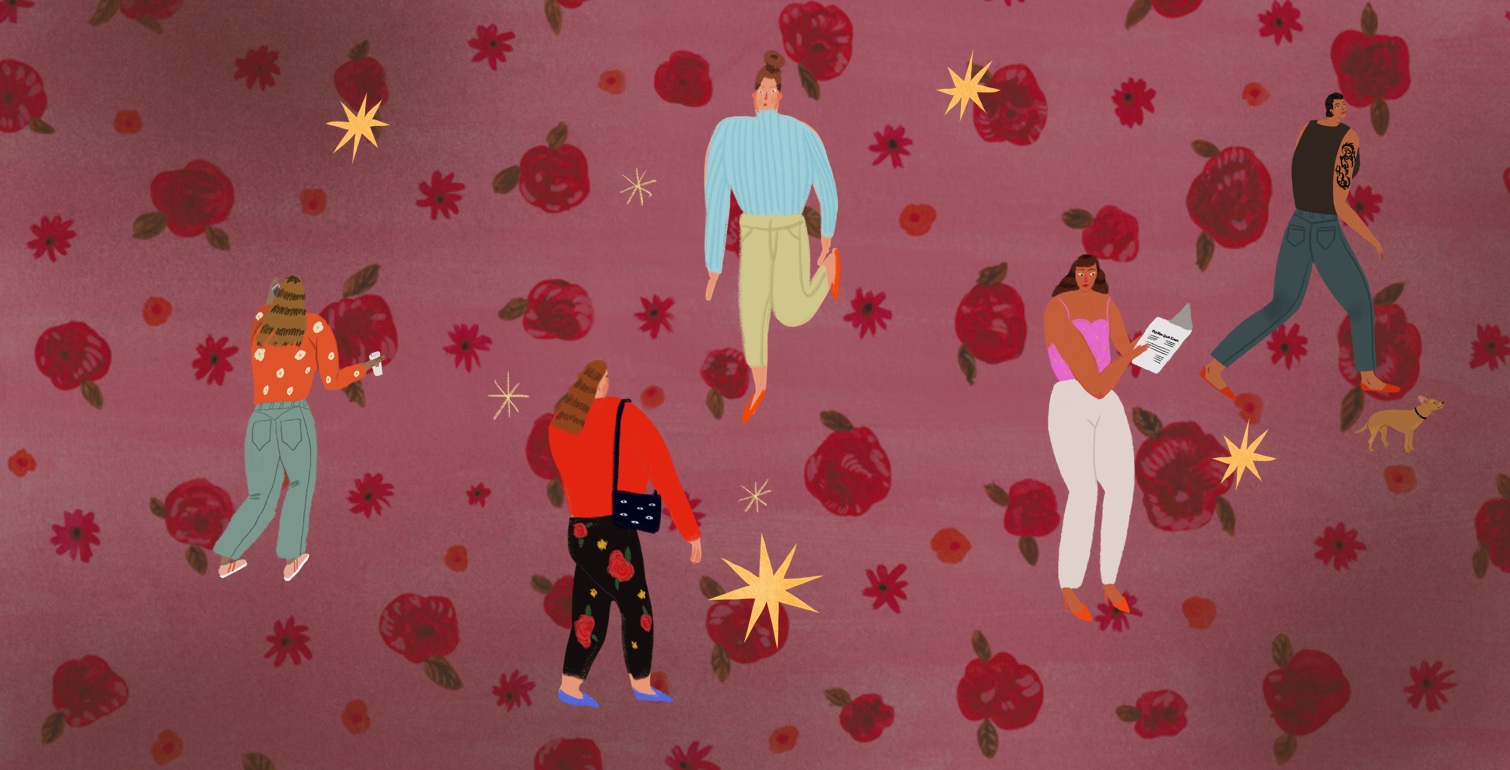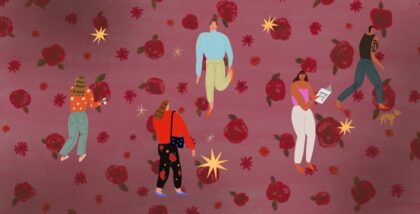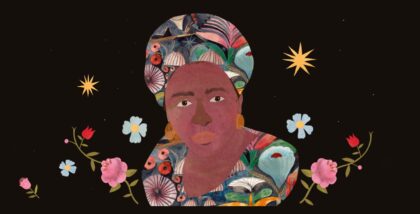
According to the WhatsApp texts the Dean’s administrative assistant had been sending me, the drivers, plural, would arrive any minute. “Inshallah,” she added. Inshallah, inshallah. She’d used this word a dozen times in texts and emails over the past week. We would be “ away,” as I described it, for a three-year visiting gig at a university in the Middle East. Who knows how long they had been out there chatting, the two men dressed like federal agents, their black SUVs double parked with hazards blinking. We’d had the annual block party a week earlier. Chalk drawings haunted the pavement up and down the block. Exhausted balloons limped from ribbons tied to the occasional railing. None of us accepted the fact that the move was more than a long vacation. It seemed over the top for the university to have sent two SUVs, but if we had packed properly, we should have filled them both. “Main character vibes,” my youngest daughter said, explaining why we had to ride separately. Ginger and I loaded into the first cavernous black vessel while, like teen celebrities, our two daughters in their dark glasses commandeered the second.
We loved our neighborhood. It had groomed us for nearly two decades. Things that drove us batshit in the early years now rallied us in solidarity against invading gentrifiers. How dare these interlopers complain about our local amateur DJ who blasted Bachata and R&B until 3AM? How dare they call the police on the teenagers I’d been trying to coax from the stoop of the last abandoned house on our block? (I admit I called the cops once myself. To call the cops is to release dark forces beyond anyone’s control. Anything could pop off once po-po arrived, but my car had been broken into, and I needed a police report. What bothered me was not so much their calling the cops, but their confidence that the cops would respond in their favor.) That we’d been harbingers of this invasion of gentrifiers is one of those facts that changes color in the evolving light of time. Greeted with skepticism when we arrived in the early 2000s, I now encountered fear and forbearance from the newest arrivals as if I were a woodland creature vainly drawn to a habitat long since erased by the expanding city. As our black SUVs convoyed through the neighborhood en route to JFK, I made mental records of things I might miss and things that might not be here when we returned. The neighborhood already looked different to me against the telescoping depth of my unfathomable future.
At one intersection, I studied a brother wearing socks and gym slippers standing several feet away from a white guy with a neck tattoo perching one foot on a longboard. They were an incongruous pair, occupying temporal dimensions that followed different rules of physics. Were they entirely unconscious of each other or was their studied disinterest part of some social contract between them? Was their difference so great as to be unbridgeable and therefore not even worth acknowledging?
That we’d been harbingers of this invasion of gentrifiers is one of those facts that changes color in the evolving light of time.
High on our to-do list after we got settled in Abu Dhabi was to get beds for the unfurnished apartment we selected on campus. Our campus is on an island called Al Saadiyat, which is the arts and education district of Abu Dhabi. Saadiyat is home, for example, to branches of the Louvre and the Guggenheim, as well as an outpost for our Western university. One of our new neighbors in the building recommended we visit a carpentry shop in a part of the city called Musaffah. The city, I discovered, is zoned like a school lunch tray. It’s about a forty-five-minute drive from Saadiyat to Musaffah, where all the warehouses, factories, and auto repair shops are located. The labor market in the UAE follows a similar logic, organized largely by nationality. If I had known more about the politics of the place, I could have predicted that Musaffah would have a large population of dark-skinned men.
The shop had no website, just a listing on Yelp. We had to visit in person to see the showroom, a loft space in a high-ceilinged garage of thrown-together shelves of lumber, tables and chairs in various states of becoming, and machines throughout whining and chirping like giant insects, all spewing an unbreathable miasma of sawdust. Happy to see a familiar face, I gave the brother at the door “the nod.” He was sitting in a busted office chair in the large maw of the garage door where cement floor met crumbling asphalt. He was wearing a Lakers T-shirt and gym slippers. He pointed with his chin to the iron staircase that led up to a door next to an air conditioner sticking out of an interior wall. The “showroom” featured two live-edge wood tables on iron legs and a display of wood types arrayed like swatches of cloth on the wall. We were greeted by an Eastern European or maybe Russian guy from behind an ancient dusty computer monitor at one of the tables. Based on our specs, he sketched a quick design. I tapped my phone on the payment terminal to give him the deposit. Easy. On the way out, I noticed all of the workers in the shop were Black men.
We had been sleeping on borrowed air mattresses, which worked fine in the short term. But the short term lost its sense of brevity. Weeks went by before I called the carpenter’s shop to ask about our order. “It will be ready in the next few days,” someone with an African accent told me over the phone. “Inshallah.” Inshallah? I was still getting acquainted with the term, but from what I initially gathered, it meant something like “I hope” or “if you’re lucky.” For real? I thought the brother was trying to play me. But I was cool and called again in a few days. I got the same response. By the third time the guy inshallah-ed me, I lost it. “Ain’t gone be no inshallah,” I announced, “cause I can tell you right now what’s going to happen. You about to build my bed or give me my money back.” Later on, I shared this fresh outrage over dinner with colleagues. They rationalized that inshallah has many connotations. It’s often used as an aperçu of humility, so as not to give the impression that the speaker’s will could ever supersede Allah’s. The carpenters were taking their time with the bed, but the guy meant no disrespect, my colleagues assured me. I was immediately embarrassed, if not ashamed, that I had mistaken such an innocent and even pious remark for a sign of shadiness and unreliability. I decided to wait a few more weeks before following up with another call.
If I had known more about the politics of the place, I could have predicted that Musaffah would have a large population of dark-skinned men.
Teaching literary criticism that semester, I found myself thinking about Mikhail Bakhtin’s notion of the chronotope in ways that seemed newly relevant. Bakhtin uses the term—literally “spacetime”—to describe the way protagonists experience location and duration, and how these work together in a particular narrative. Starting with the Greek novel of antiquity, elements of which we still find in novels today, Bakhtin theorized a chronotope he called “adventure time,” which contains placeless places and timeless time. “All of the action in a Greek romance, all of the events and adventures that fill it,” Bakhtin writes, “constitute time-sequences that are neither historical, quotidian, biographical, nor even biological and maturational.” In adventure time, the plot advances by chance and by the caprice of the gods, and not so much as a result of social and historical contingencies nor even of the hero’s efforts. Events that trigger and prod the adventures that the hero endures leave no real impression on the hero’s character either. The hero experiences many trials, but remains the same person with the same desires and ethical principles she or he had (or did not have) at the start. “In this kind of time, nothing changes: the world remains as it was, the biographical life of the heroes does not change, their feelings do not change, people do not even age. This empty time leaves no traces anywhere, no indications of its passing.” Adventure time, according to Bakhtin, “is an extratemporal hiatus.”
That word “hiatus” makes me think of the way we Americans often talk about taking “time off.” Outside of the labor market, I’m not sure I understand what we’re saying, though, when we use that term. Does taking time off allow us to opt out of one shared reality in favor of another or even a wholly idiosyncratic one? Is it that, when we take time off, we enter a state of denial and attempt to ignore the inescapable world that our lives are intimately bound to? Maybe we want a break from a relationship without circumstances having changed when we get back together except that we’ve reclaimed a sense of newness in which we can pretend that the once-stale partner has become freshly unpredictable. Maybe we want to travel somewhere, but we want to stay safe in the resort where the comforts are Western and the service staff are culturally and linguistically familiar. All that changes is the weather. In adventure time, challenge lacks adversity because it’s curated by tour guides and hyped by our favorite playlists. Adventure time attaches our fates to circumstantial evidence like the number of petals on a daisy or the umbrage we might project onto an indifferent groundhog predicting the length of the seasons.
Privately, I have often thought of white Americans inhabiting what I call Friends time, a twentieth century version of adventure time in which Black people, if not all people of color, our bodies and the histories our bodies remind them of, do not exist. Friends time demonstrates how easy it can be to compartmentalize our histories and cultures. The popular sitcom Friends ran on primetime (yet another chronotope?) television and proved how seductive a world without diversity could be for people whose identities depend on fictions of historical innocence.
When I was an undergrad, I found it confusing that my professors would teach Modernist poetry, for example, while pretending the Harlem Renaissance wasn’t happening at the same time. My professors would teach Pound, Eliot and Williams as if they had no idea that Hughes, Cullen and McKay were publishing in the same literary market or even that the poets associated with the Harlem Renaissance even existed. How could my professors, avatars of wisdom and insight, dispense so readily with common sense? For the record, the letters between Pound and Hughes are a hoot, and they reveal a world in which writers (miraculously!) read each other’s work.
Thus, Friends time insinuates itself into our perceptions of daily experience, leading some to believe that we can move through our very neighborhoods and hometowns unaltered by contact and commerce with others. One evening, in that period when the harbingers of gentrification had just begun dispensing craft beers and avocado sandwiches in my Brooklyn neighborhood, a young white woman straight-up ran away from me when she noticed I was taking the same route home as her from the bus stop. We were walking at roughly the same pace within peripheral view of one another. To be polite, I slowed down to let her walk further ahead, but I did so at the very moment that she slowed down to avoid walking beside me. We noticed each other’s actions then sped up at the same time. I recognized this as a common urban occurrence of synch-walking. She saw, I can only guess, a Black man preparing to attack. What other motive could I have had? I had transgressed against deeply internalized US American norms of segregation. We may have been walking in the same place at the same time, but we had been trained, essentially, to occupy different worlds.
Is it that, when we take time off, we enter a state of denial and attempt to ignore the inescapable world that our lives are intimately bound to?
Having briefly lived abroad in my early twenties, I knew it was possible to recognize myself outside the peculiarly American finger trap of race-time. For years now, I have carried on a conversation in my head with Langston Hughes’ 1926 essay “The Negro Artist and the Racial Mountain.” A young poet Hughes knows says he wants to be a poet as opposed to a Black poet. Hughes deduces from this that the poet wants to be white. As I read it, Hughes reasons that there are two essential identities available in the US, and that any attempt to shake one demonstrates a desire to embrace the other. I had my doubts that Hughes accurately diagnosed the young poet in question and that he had faithfully portrayed the realities of race in 1926. I think, however, that Hughes’s view, if it indeed held then, could not possibly hold today. Our territories of space and time are irreconcilably different. I say this with some hesitation because I’d prefer to believe my ancestors speak to me unmediated by time, that their wisdom is timeless.
If I could imagine myself outside the symbolic order of American race—which is not to delude myself into believing that race doesn’t matter or that I should be immune to its effects—could I even survive that momentary exile? Could I see my skin without shuttling it along the one trajectory of meaning given to it by my kith and country, and nonetheless return home? Or would my knowledge of what it means to exist in the wild permanently mark me as alien, a sellout who had dared to stand naked before the harsh light of histories not my own? Put another way, is American racism such an integral component of my blackness that any attempt to escape from it is merely an attempted hiatus from myself?
Driven, in however small a way, by a desire to shed the weight of undeserved stigma, Black Americans are often drawn to expat life not simply in search of belonging, but in search of places that do not actively sequester the imagination. The UAE—specifically, Abu Dhabi and Dubai, which are an hour and a half drive apart—is a haven for Black Americans who find life back home suffocating and have the means to escape it. There is antiblackness everywhere, but in the UAE, Black Americans can exercise a greater measure of the ingenuity and chutzpah that is their birthright without having to contend with the structural biases that tilt the playing field against them in the US. Still, it took me a minute to sort out the seeming (at the time) contradiction that Black Africans in the UAE might occupy more precarious registers of the economic order while Black Americans might flourish.
The first time someone mistook me for an Arab was in the supermarket (or “hypermarket” as they are called). A woman spoke to me in Arabic and when I replied that I only speak English, she regarded me with pity, as though I had merely disappointed her. I was so used to being othered in dehumanizing ways at home that being chided by someone who wanted me to be familiar made me feel as if I could. The vector of exclusion that I am used to is visual and aesthetic. That I didn’t “look Arab” said more about my narrow US American stereotypes than it said about my phenotypical profile. Could it be that I have ventured forth from Brooklyn in some derivative form of Friends time in which I could only see the Western conception of race as a social organizing principle? I suspect the woman would have responded differently to me if I didn’t have an American accent. I’m sure there were other forms of exclusion at play, but for that moment, in the absence of a familiar metric, I experienced only unbounded possibility. “One day, you will learn,” the woman said, “inshallah.” She was talking about the language, but to me her words prophesied a more transcendent lesson.
In an article for The New York Times, Abdullah Shihipar says inshallah bridges the many languages and cultures in which Islam is practiced. He writes, “inshallah is a reminder of the delicate balance between agency and faith.” Inshallah is context-specific and describes the intersection of divine and individual will, physics, and the complex array of political, historical and social constructs that the outcome of any event depends upon. The Quran advises, “never say of anything, I will definitely do this tomorrow without adding, if Allah so wills.” Inshallah, even if used ironically, at least compels the utterer to consider their relationship to the circumstances that their ambitions are contingent upon. It demands that we acknowledge the mysteries of self and other at the frontier of human perception, the frontier of the spiritual and the sublime. I began to think of inshallah as a chronotope of omni-dimensional awareness and possibility, and, like learning a language, I set about rearranging my headspace to accommodate this new grammar.
I was so used to being othered in dehumanizing ways at home that being chided by someone who wanted me to be familiar made me feel as if I could.
I finally called the carpentry shop again. The number was no longer in service. Inshallah aside, I had been in the UAE long enough to understand that I possessed a kind of Karen that I now know to call “passport privilege,” and I called the cops. Sure did. Ain’t gonna lie. A recorded voice gave me the address of the police station in Musaffah where I could register my complaint. After a short wait in the station’s brightly tiled reception area, Ginger and I were directed to an office occupied by two uniformed officers speaking Arabic. I apologized for the interruption and explained what had happened, that a shop in the area had absconded with my deposit. The officers exchanged looks, then the one behind the desk spoke slowly, in a conciliatory tone. “Sir, did you try visiting the shop to ask what happened?” Well, no. I hadn’t. “Why don’t you go there again, now,” he suggested, “and talk to them. After that, if there is a problem, come back and we will look into it.”
On the short drive over from the police station, I psyched myself up for a fight. I pictured myself approaching a knot of rowdy teenagers hanging out in front of the shop. Only it was the same dude in the Lakers jersey and gym slippers as before. I marched past him toward the stairs like I had a warrant for the Russian guy’s arrest.
“No one is there,” said Gym Slippers.
“When will he be in?”
“They’re gone.”
“Who’s gone?”
“Talk to Tony.”
Tony came hurrying from the back of the shop when Gym Slippers called him. Tony was a tall brother in his early forties. Tony explained that the Russian guy worked for a British guy, and the British guy had emptied the bank account and returned home to England. The Russian left to find another job. All the African dudes in the shop were maintaining this commercial masquerade because they were either in the country on expired visas or they didn’t have permission to work at all. All of them (except Gym Slippers, perhaps) were working around the clock to fill the back orders, pretending like they still reported to a British guy who, whether he cared or not, was and would ever be the owner on record. Tony thanked me for my patience and for giving him an opportunity to make things right. He was most grateful, he said, that I had not gone to the cops. I assured him that that was the furthest thing from my mind. “We have to look out for each other,” I said. “Take your time, I’ll get the bed when it’s ready.”
“Inshallah,” he said.
“Inshallah.”





















